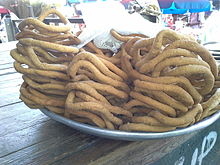food.wikisort.org - Dish
Kuli-kuli is a West African snack primarily made from peanuts. First made by the Nupe People of West Africa[citation needed] it is a popular snack in Nigeria, Benin, northern Cameroon and Ghana. It is often eaten alone or with a mixture of garri also known as cassava flakes, sugar and water popularly called "garri soakings". It is also eaten with Hausa koko, fura, kamu; and is sometimes ground and put into salad. It is often ground as used as an ingredient for Suya and Kilishi.[1][2][3][4]
Kuli-kuli is a byproduct of processing raw peanuts into peanut oil.[5][6]
Ghanaian Kuli-Kuli
Kuli kuli (a groundnut/peanut cake) in Ghana just like in many parts of West Africa is a common crispy snack.[7] The ingredients and shapes used however is not universal throughout the country. In the northern part of the country especially among the Mole-Dagomba people, Kuli kuli is made from the residue gotten from groundnuts during the extraction of groundnut oil.[8] It is mostly found in the Zongo communities in Ghana.[6]
Preparation
To make kuli-kuli, peanuts are roasted and then ground into a paste called "Labu". The paste is then mixed with spices, salt, and sometimes ground pepper, and occasionally sugar. The paste is stripped of excess oil with water and made into the desired shape (round balls, cylinders, etc.). Adding potash to the oil increases the boiling point of the oil. This results in oils being extracted from the kuli-kuli so that more liquid oil is created than when the process started. While being heated and fried, the shaped peanut-paste begins to solidify and harden. It is then removed from the oil and allowed to cool down until ready to be eaten. It has a very long shelf life and is often given to children as a treat or sold in taxi parks by teenage girls to hungry travelers.
All aspects of producing and selling the peanut oil and kuli-kuli are socially considered 'woman's work'. Quite often, women control all aspects of kuli-kuli production and sales. Women grow the crop, extract and refine the oil, cook the kuli-kuli, carry it to the market, and sell it. In many cultural groups, this is considered 'her (personal) money' generated to spend as she deems fit. In contrast, a man growing peanuts is more likely to sell his entire crop of 100 kilo bags wholesale. The wholesaler will be responsible for transportation.[9]
Health Benefits
Kuli-Kuli contains proteins because of the peanuts from which it is made. It also contains Magnesium, Phosphorus and Vitamin E.[6]
Gallery
- Making kuli-kuli in Ghana
 Kulu-kuli made in Bongo
Kulu-kuli made in Bongo- Kuli kuli, a local snack
See also
- List of African dishes
- Hausa People
References
- "kilishi - Google Search". www.google.ie. Retrieved 2020-03-24.
- Nigeria, Online; Webby. "Home". OnlineNigeria.com. Retrieved 2020-03-24.
- "BETUMI". BETUMI. Retrieved 2020-03-24.
- "Foods and Recipes From Our Motherland Nigeria". BuzzNigeria - Famous People, Celebrity Bios, Updates and Trendy News. 2017-05-24. Retrieved 2020-03-24.
- "Foods and Recipes From Our Motherland Nigeria". BuzzNigeria - Famous People, Celebrity Bios, Updates and Trendy News. 2017-05-24. Retrieved 2020-03-24.
- "NEWS". miczd.gov.gh. Retrieved 2020-06-07.
- "Ghana: Kuli-Kuli". 196 flavors. 2019-06-26. Retrieved 2019-11-23.
- Ali, Sunday. "Kuli kuli(groundnut cake) Recipe by Sunday Ali". Cookpad. Retrieved 2019-11-23.
- "Nigerian Food TV - Nigerian Food blog, Nigerian Food TV Channel, Nigerian Cuisine, Nigerian Food Recipes TV, African Food Blog". Nigerian Food TV. Retrieved 2020-03-24.
External links
Другой контент может иметь иную лицензию. Перед использованием материалов сайта WikiSort.org внимательно изучите правила лицензирования конкретных элементов наполнения сайта.
WikiSort.org - проект по пересортировке и дополнению контента Википедии



